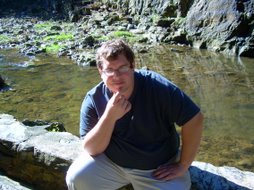
Nope. I haven't done a music related post recently. But since I've dug this up today, I had to share it, even though Progday '08 is nine months from now.
This photo was taken from Progday '98, I believe. And if memory serves me, the idea was to get all the movers and shakers of the east coast Prog scene (concert promoters, those who had prog labels, studios, major vendors) onstage.
The guy in the black shirt is Chris Lamka, who owned Of Sound Mind, a Baltimore store that sold Prog. He still runs a mail order business from his house. To his left was Adam Levin, and to Adam's left, Mike Potter. Both were involved in Orion Studios, which is primarily a music studio. Many showcases were held there (and still are from time to time). To Chris's right is Rob LaDuca, who along with Chad Hutchinson, founded Nearfest--THE best of progfests. Second from the far right is Peter Renfro, founder of Progday, the longest ever running progfest.
The guy in the black shirt is Chris Lamka, who owned Of Sound Mind, a Baltimore store that sold Prog. He still runs a mail order business from his house. To his left was Adam Levin, and to Adam's left, Mike Potter. Both were involved in Orion Studios, which is primarily a music studio. Many showcases were held there (and still are from time to time). To Chris's right is Rob LaDuca, who along with Chad Hutchinson, founded Nearfest--THE best of progfests. Second from the far right is Peter Renfro, founder of Progday, the longest ever running progfest.
Of course, I've missed a few names, but those are the ones I recognize on sight. Who knew that ten years later, I'd share this piece of Prog history on something called a blog?
